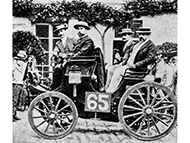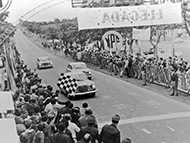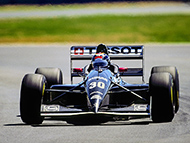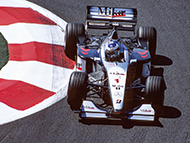From Mercedes-Benz Press Release
Motorsport success is part of the DNA of the Mercedes-Benz brand. Two vehicles with Daimler licence engines won the first automobile competition in history 130 years ago. Mobility pioneer Gottlieb Daimler and his son Paul were among the visitors to this automobile race from Paris to Rouen on 22 July 1894. 20 years later, Paul Daimler remembered this event, which was also characterised by the competition between different drive technologies:
“A huge crowd flocks to see the unique spectacle. The racing cars, fundamentally different in shape, type and size, heavy steam cars with trailers and huge power, compete with the lightest steam tricycles, and these in turn compete with petrol cars. […] We accompanied the race in our motorcar.It was a strange spectacle to see so many fundamentally different types of vehicles competing in speed: there were the firemen of the heavy steam cars, sweating, soot covered, working hard piling on the fuel; the drivers of the small steam tricycles, constantly checking the pressure and water level in the small, artistically constructed boiler and regulating the oil firing; and in contrast, the drivers of the petrol and oil-fired vehicles sitting still on the driver’s seat, adjusting a lever now and again, as if they were driving purely for pleasure – truly a strange comparison and an absolutely unforgettable sight that will stay with me throughout my life.”
Paul Daimler, former Technical Director of Daimler-Motoren-Gesellschaft, in 1914
Since this long-distance race, the brand has repeatedly made motorsport history in various categories. The numerous anniversaries in 2024 also include the victory in the 1924 Targa Florio 100 years ago and the first start of the Mercedes-Benz W 25 some 90 years ago at the Nürburgring in the 1934 Eifel race – the premiere of the “Silver Arrows”.
Expanded digital motorsport archive
To mark the motorsport anniversary, the Mercedes-Benz Group Archive has comprehensively expanded, restructured and visually optimised the motorsport history section of the digital multimedia archive and research system M@RS – initially in full detail for the period from 1894 to 1955. Further additions will be made successively. In addition to the familiar categories of drivers, vehicles, races, rallies and record drives, a fourth, superordinate category “eras, racing series, championships” has been introduced as a new part of the system. Introductory texts and a classification of the relevant vehicles, drivers and successes provide an initial overview of the motorsport history of Mercedes-Benz. This makes M@RS, which has been the benchmark for archive and media databases for many years, even more user-friendly. Link: https://mercedes-benz- archive.com/go/Motorsport
Brief summary: Anniversaries from 130 years of Mercedes-Benz motorsport history
1894 (130 years ago): On 22 July 1894, the French newspaper “Le Petit Journal” organised a race for motor vehicles for the first time. It ran over 126 kilometres from Paris to Rouen. Victory was shared by two vehicles with Daimler licence engines from Peugeot and
Panhard & Levassor. This competition is regarded as the birth of motorsport.
1899 (125 years ago): From 21 to 25 March 1899, the first “Nice Week” took place, a motorsport event consisting of various competitions with international appeal. On the Nice– Colomars–Tourrettes–Magagnosc–Nice tour, Wilhelm Bauer won the two-seater class and Wilhelm Werner the four-seater class. Both started with a Daimler “Phoenix” 12 hp. Two years later, the Mercedes 35 hp would dominate the 1901 Nice Week – the first Mercedes ever and the first modern car.
1904 (120 years ago): Thanks to Camille Jenatzy’s outstanding victory in the 1903 Gordon Bennett race with a Mercedes-Simplex 60 hp, Daimler-Motoren-Gesellschaft brought the prestigious race to Germany for 1904. This first major motor race in this country took place on a circuit in the Taunus. In order to maximise its chances of victory, the brand started with two white-painted Mercedes 90 hp racing cars for Germany and three identical vehicles in black and yellow paintwork for Austria. Mercedes came in 2nd, 3rd, 5th and 11th.
1914 (110 years ago): Mercedes won the French Grand Prix in Lyon on 4 July 1914 with a one-two-three victory. Christian Lautenschlager crossed the finish line in first place, followed by Louis Wagner and Otto Salzer – all in Mercedes 115 hp Grand Prix racing cars with a 4.5-litre four-cylinder engine with four-valve technology.
1924 (100 years ago): Christian Werner won the gruelling road race for the Targa Florio and the Coppa Florio 1924 in Sicily with the Mercedes 2-litre racing car with supercharged engine. Mercedes-Benz Classic is celebrating the anniversary in 2024 with the recommissioning of an original 1924 racing car after extensive restoration.
1934 (90 years ago): The new Mercedes-Benz W 25 750-kilogram formula racing cars made their debut in the Eifel race at the Nürburgring on 3 June 1934. Manfred von Brauchitsch won the race.
1954 (70 years ago): Mercedes-Benz entered the new W 196 R racing car in Formula One for the first time in the French Grand Prix on 4 July 1954 in Reims. Juan Manuel Fangio won, followed by Karl Kling. Fangio became Formula One World Champion with the new Silver Arrow in 1954 and 1955.
1964 (60 years ago): A one-two-three victory in the Argentine Grand Prix for touring cars from 28 October to 7 November 1964 was the fourth success in a row for Mercedes-Benz in the endurance competition. Eugen Böhringer and Klaus Kaiser won the 4,779.6-kilometre race with many full-throttle passages ahead of Dieter Glemser and Martin Braungart as well as Ewy von Korff-Rosqvist and Eva-Maria Falk – all in Mercedes-Benz 300 SE rally cars (W 112). In the summer of the same year, Robert Crevits and Georges Gosselin also won the 24-hour race at Spa-Francorchamps from 25 to 26 July 1964 in a 300 SE.
1984 (40 years ago): The new Nürburgring opened on 12 May 1984 with a race of
20 champions with 20 identical Mercedes-Benz 190 E 2.3-16 cars. Ayrton Senna, still unknown at the time, won ahead of Niki Lauda and Carlos Reutemann.
1994 (30 years ago): In the Penske-Mercedes PC-23 IndyCar, Al Unser Jr. won the Indianapolis 500-mile race on 29 May 1994. The 3.4-litre V8 500I engine from Mercedes- Benz, which was developed in strict secrecy and was vastly superior, was decisive for the spectacular victory. Due to a subsequent change in the regulations, this was the only race outing for the engine.
1994 (30 years ago): Mercedes-Benz returned to Formula One in 1994, initially as a partner of Peter Sauber’s Swiss team. Ilmor developed the Mercedes-Benz engines in Brixworth, Great Britain.
1994 (30 years ago): Klaus Ludwig became champion in the German Touring Car Championship DTM for the third time in the 1994 season with the AMG-Mercedes C-Class.
1999 (25 years ago): Mika Häkkinen became Formula One World Champion with McLaren-
Mercedes for the second time in a row in 1999. In the final race of the season, the Japanese Grand Prix on 31 October 1999, Häkkinen secured the title in the McLaren-Mercedes MP4/14.
2014 (10 years ago): The Mercedes AMG Petronas F1 works team, founded in 2010, won its first double world championship in 2014 with the drivers’ title for Lewis Hamilton and the constructors’ title. This was the start of a run of success for the Silver Arrows with eight constructors’ titles and seven drivers’ titles in a row.
* Further information on the official fuel consumption and the official specific CO2 emissions of new passenger cars can be found in the “Guide on the fuel consumption, CO2 emissions and power consumption” of new passenger cars, which is available free of charge at all sales outlets and from Deutsche Automobil Treuhand GmbH at www.dat.de.













